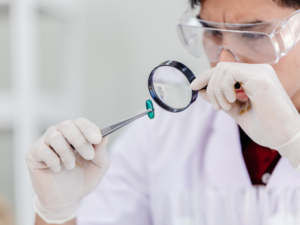Maryland product liability law serves an integral purpose: holding producers and sellers liable when defective products cause injury to consumers. You may wonder, “What does the plaintiff have to prove in a Maryland product liability lawsuit?” Maryland product liability litigation requires plaintiffs to prove three fundamental elements: the presence of a defect, direct cause and effect relationships between injury and damages sustained by the product, and actual losses suffered.
An understanding of these requirements is absolutely critical in any Maryland product liability suit, as their totality forms the burden of proof that must be successfully fulfilled to secure fair compensation for victims.
Contact Us Today to Schedule
a Free Consultation
Product liability refers to the legal obligation of manufacturers and sellers to ensure that their products do not cause injury to anyone who uses or buys them. Maryland law mandates that any product entering the marketplace meet consumer safety expectations from an observation and liability standpoint.
Maryland applies both negligence and strict liability doctrines in making its determinations. Negligence requires the plaintiff to demonstrate that the defendant failed to exercise reasonable care when designing, manufacturing, or labeling products. Strict liability requires evidence showing the product was deficient upon leaving the defendant’s hands, regardless of the care they took in producing or transporting it. Maryland courts closely examine product liability cases under the Consumer Protection Act, which covers legal standards and statutes to balance consumer protection with fair business practices.
To be successful, you must show that a product was defective, that it directly caused your injury or damages, and that you suffered real losses. Call our Maryland product liability lawyers today to discuss your legal options.

Recognizing such flaws is the first step in filing product liability suits, allowing a claimant to demonstrate that he or she received unsafe products.
Establishing causation in a Maryland product liability case isn’t simply beneficial but indispensable. To have a successful product liability lawsuit, the plaintiff must prove a clear connection between product defects and injuries sustained
This link establishes that any harm suffered was directly due to product malfunction. If a bicycle’s defective brake system causes an accident, the plaintiff must show that this malfunction caused the incident rather than rider error or another factor. Maryland courts demand clear attribution of blame to defects to accurately assign responsibility. Without this essential link between defective products and injuries, victims in Maryland won’t be able to claim the compensation they deserve.
Product liability lawsuit damages in Maryland range from tangible expenses like medical costs and lost wages to intangible harms like pain and suffering and emotional distress. Plaintiffs can recover both types of compensation. Calculation of damages requires thorough, careful work.
Economic losses may be measured using bills and employment records as objective evidence. At the same time, noneconomic damages, while more subjective, should still be carefully considered according to severity and permanence.
Documentation is essential, providing evidence supporting any claims for damages made against third parties. Expert testimony also serves an invaluable purpose by offering professional insights into how an injury occurred and its ongoing implications – these elements come together to form a compelling argument on behalf of plaintiffs to seek maximum damages award from defendants.
The best chance of success comes from hiring an experienced Maryland product liability lawyer who can provide essential legal expertise in Maryland statutes and case law to demonstrate fault. Proving fault requires gathering and presenting evidence carefully while crafting narratives that align defective products with negligence or strict liability standards as determined by Maryland law.
A skilled product liability lawyer will help shoulder the burden in court proceedings. Lawyers ensure every aspect of a case – from defects and causation through damages- is supported with solid evidence and expert witness testimony, becoming advocates and strategists capable of dissecting opposing arguments and anticipating possible challenges before they occur.
When it comes to product liability lawsuits in Maryland, Regan Zambri Long gives you the edge. Our law firm is full of experienced lawyers who consistently fight for justice on our clients’ behalf. Our Maryland product liability attorneys possess deep knowledge of Maryland product liability laws and a compassionate and helpful attitude when handling each case.
We approach each case with dedication and personal attention, which has led us to recover millions of dollars on behalf of our clients.
If a defective product in Maryland has injured you or a loved one, don’t take on the burden of proof alone. Let Regan Zambri Long help you prove the defect, causation, and damages. Call us today for a free case evaluation and take the first step toward justice.